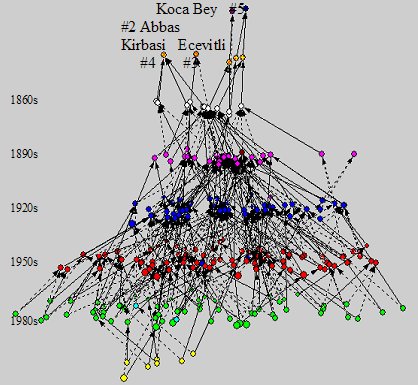
| Part of a series on |
| Political and legal anthropology |
|---|
| Social and cultural anthropology |
Network Analysis and Ethnographic Problems: Process Models of a Turkish Nomad Clan[1] is an anthropological and complexity science book by social anthropologists Douglas R. White, University of California, Irvine, and Ulla Johansen of the University of Cologne. It is considered an important publication in anthropology[2] and the political science of Central Asia.[3]
The breakthrough is to code and portray the data of a longitudinal ethnography of a given people as a complex interactive system, in this case from an ethnogenesis in the late 18th century in Turkey to the present date, based on the detailed genealogies and chronicles recorded in fieldwork carried out between 1956 and 2004 recorded by ethnographer Ulla Johansen. The analysis of these data provides for an account of social dynamics relevant to many parts of the Middle East.
- ^ 2006 in paperback, ISBN 0-7391-1892-7 and 2004 in hardcover
- ^ Reviewer Alvin Wolfe writes it "...could be the most important book in anthropology in fifty years"
- ^ Amazon reviewer T. Martin Doyle writes 'The White and Johansen approach to "network analysis" provides the framework for unparalleled examination of sub-national political behavior. This tool for nonlinear dynamic analysis encourages detailed assessment of highly decentralized self-organizing local governance structures otherwise unavailable through state level scrutiny. Those involved in the study of comparative politics will come to appreciate the meticulous findings exacted through use of this "network" construction. Additionally, examining the interaction of inter-governmental organizations, non-governmental organizations, or transnational advocacy networks with state government infrastructure becomes far more precise, compliments of White and Johansen.'
© MMXXIII Rich X Search. We shall prevail. All rights reserved. Rich X Search
